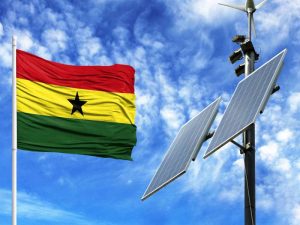Ghana’s economy crucial to its energy transition drive
May 15, 2023386 views0 comments
By Isaac AIDOO, in Accra, Ghana
GHANAIAN economists and experts in the energy space have cautioned that Ghana’s energy transition strategy must take into account the country’s current economic circumstances and future survival needs, in order to achieve a smooth transition.
Read Also:
Ghana is facing one of its worst economic crises in decades. Soaring inflation is compounding the sufferings of many Ghanaians who now have to dig deeper into their pockets to afford essential goods. Businesses are struggling with high lending rates on the back of the tight monetary stance of the country’s central bank, in its bid to arrest inflation.
In spite of this crisis, Ghana is aiming to achieve net zero emissions by 2070, the cost of which has been estimated at $561.8 billion, according to its National Energy Transition Framework.
The country intends to conditionally reduce its greenhouse gas (GHG) emissions by at least 45 percent by 2030. The country’s nationally determined contributions (NDCs) under the Paris Agreement outline two main goals relating to the energy transition: These are scaling up renewable energy penetration by 10 percent by 2030; and scaling up 120 million standard cubic feet (MSCF) natural gas replacements of light crude oil for electricity generation in thermal plants.
With a gross domestic product (GDP) of about $72 billion and annual tax revenue of less than $6 billion, the experts are wondering what the impact will be on current revenue efforts and the economy as a whole.
“How will Ghana be able to finance the transition considering its present economic situation? Which critical investments could be sacrificed for the energy transition commitments? How does the government intend to deal with the potential revenue losses as a result of the transition from fossil fuel to cleaner energy sources?” the experts wonder.
Steve Manteaw, chairman, Civil Society Platform on Oil and Gas (CSPOG) and co-chair of the Ghana Extractive Industries Transparency Initiative (GHEITI), and Alex Ampaabeng, economist with the Natural Resource Governance Institute (NRGI), expressed these concerns during a media workshop on Ghana’s energy transition preparedness.
The dire economic situation
Ghana’s growth slowed to 3.2 percent in 2022, down from 5.4 percent in 2021. The slowdown affected mostly the non-extractive sectors, as the recovery in gold exports supported extractives’ growth.
With a debt to GDP of about 104 percent, the country has suspended the payment of its sovereign debts in a bid to avert depletion of its foreign currency reserves.
Ghana has recently implemented a domestic debt exchange programme (DDEP) which has negatively affected most businesses and individuals leading to heavy losses for bond holders
Banking sector vulnerabilities have increased because of the cedi depreciation and the impact of the concluded DDEP. Implementation of the programme is already impacting the country’s financial sector due to the heavy exposure of banks, insurance companies and pension funds to government debt. It is estimated that 42.1 percent of government domestic debt is held by these entities.
Downgrades from S&P and Fitch led to a loss of investor confidence in Ghana and made the Ghanaian market unattractive to foreign money market managers.
It is hoped that a successful IMF bailout by half year 2023 should hopefully provide some policy credibility and restore investor confidence.
A tightrope for Ghana
Manteaw recalled that between 2011 and 2021 Ghana made $6.2 billion in oil revenues and “between 2021 and 2070 when Ghana plans to transition, lie 50 years, so holding all things equal and assuming depleted resources would be replaced in equal measure, Ghana could earn $31 billion.”
He contends that even though petroleum revenues do not dominate the national budget (6% – 12%), for a debt distressed economy, the loss of such revenues could pose substantial fiscal disruption for the country.
To transition, countries need to develop new technology, especially in renewable energy production and storage. Manteaw maintained that it will require investments in research and development, noting that “petroleum revenues afford such financing opportunities.”
The transition and revenue mobilisation drive
Ampaabeng lamented that Ghana’s energy transition would undoubtedly have major implications for the country’s revenue mobilisation efforts, especially at the time when the economy was in dire straits, and the government was struggling to meet its revenue targets, in the wake of a general foreign aid crunch. It is therefore crucial that the government in pursuing the transition framework averts its mind to the existing economic challenges.
The way forward
Civil Society Organisation in the extractives governance space – the NRGI maintains that delivering a sustainable and a ‘just’ energy system for the future will require collaboration and action across energy, business, and government ecosystems.
“It will require effective resource mobilisation at all fronts, including dealing with persistent corruption, leakages, and other illicit outflows in the system,” it adds.
To chart the path forward, a strong fiscal policy to maximise domestic revenue mobilisation must be at the forefront of the government and its development partner’s agendas. It also requires key stakeholders such as the media and the civil society organisations in the country to play active roles, both in revenue mobilisation and expenditures.
As the government embarks on key reforms to generate more revenue to finance the transition, accountability will be pivotal (going forward) to ensure that revenue collected, specially earmarked funds are channelled to provide the needed investments to meet the set targets.

